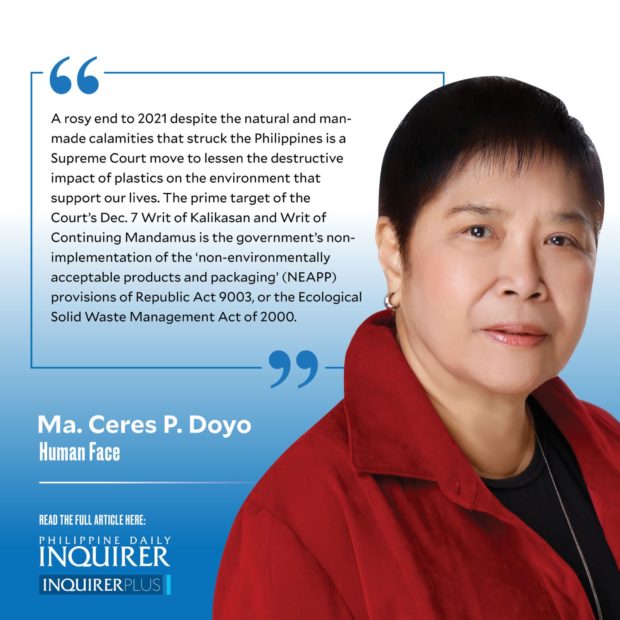First, my virus-free salutation:
From my patch of green on earth where I write, New Year greetings of hope, joy, and peace. Against all odds, kapit-bisig tayo sa 2022!
And when the monster has retreated at last, I will fling open the gates and emerge from my cloister garden. I will rush out to the streets to break bread with scoundrels, sages, and saints.
* * *
Those of you who have been shopping online during these past two pandemic years must have noticed the thick bubble wrap protecting your purchases. In the rate and feedback section of the shopping apps, many buyers even praise the sellers for the secure packaging and post photos and videos of purchases received and mountains of bubble wrap.
Here’s wishing that the “Thank you seller” for bubble wrapping would now change to “Thanks for the environment-friendly packaging.” Better still if the buyer chats with the seller to say less or no plastic is better. Or no plastic spoons, forks, knives, and thingamajigs.
A rosy end to 2021 despite the natural and man-made calamities that struck the Philippines is a Supreme Court (SC) move to lessen the destructive impact of plastics on the environment that support our lives. The prime target of the SC’s Dec. 7 writ of kalikasan and writ of continuing mandamus is the government’s non-implementation of the “non-environmentally acceptable products and packaging” (NEAPP) provisions of Republic Act No. 9003, or the Ecological Solid Waste Management Act of 2000.
Fifty-two petitioners from civil society including Quezon City-based Oceana Philippines, Puerto Princesa City-based Environmental Legal Assistance Center, Davao City-based Interfacing Development Interventions for Sustainability (IDIS), and Cebu City-based Philippine Earth Justice Center went to the SC to seek a solution to the plastics scourge that is slowly choking the environment. The SC acted positively on their petition.
According to the EcoWaste Coalition, Section 29 of RA 9003 mandates the National Solid Waste Management Commission (NSWMC) to prepare a list of non-environmentally acceptable products one year after the law has taken effect. Section 30 of the law bans commercial establishments from selling or conveying products placed, wrapped, or packaged in non-environmentally acceptable packaging after the phase-out period.
EcoWaste Coalition national coordinator Aileen Lucero rejoiced upon learning of the SC resolution: “This will hasten our nation’s quest toward a zero waste and toxic-free circular economy.”
Comments and words of praise from warriors for the environment:
Camille Parpan, counsel for the petitioners: “[We] welcome and consider the resolution and the immediate action by the SC meaningful in the imperative fight against the plastic crisis. The issuance of the writs by the SC, and the referral to the Court of Appeals for hearing and reception of evidence, is indication that the Court stands by its affirmed human stewardship of the planet. ”
Lawyer Mark Peñalver of IDIS, a Mindanao-based NGO that works for the protection and sustainable management of the watersheds in south-central Mindanao: “We saw how plastic pollution affects our watersheds and our water sources and endangers wildlife and their habitats. IDIS, along with our partners, was successful in lobbying for the regulation of single-use plastics in Davao City. However, without clear guidelines from the national government, the LGUs can only do so much within its authority.”
Petitioner and lawyer Gloria Estenzo Ramos said the SC resolution “sets a solid foundation and precedent upon which we can build our collective efforts to battle the plastic crisis.”
Noli Abinales, president of Buklod Tao, Inc.: “Had the NSWMC complied with the requirements of RA 9003 on the listing and eventual phase-out of NEAPP 20 years ago, our struggle toward a zero waste and non-toxic economy would have been more within our reach.”
Sonia Mendoza, chair of Mother Earth Foundation: “We welcome the SC’s resolution on the groundbreaking plastic pollution lawsuit filed by the civil society. This we hope will lead to industry switching to clean production and sustainable product redesign in order to replace hazardous chemicals in the manufacture of goods and their packaging, so they can be safely used, reused, or recycled. The issuance of the long-awaited NEAPP list will be good for the people and the planet, and will be profitable for business in the long run.” We rejoice but we must stay vigilant.
